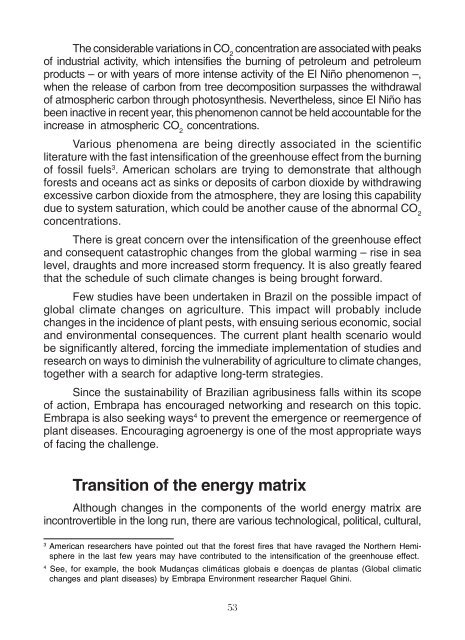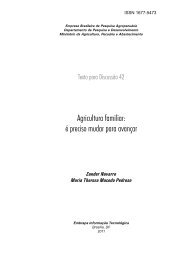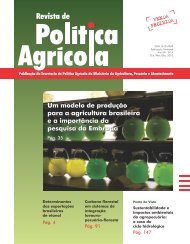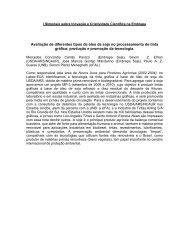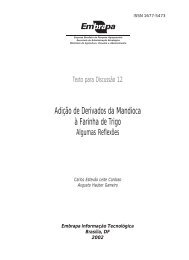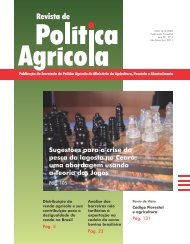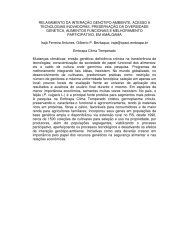Ministry of Agriculture, Livestock and Food Supply - Embrapa
Ministry of Agriculture, Livestock and Food Supply - Embrapa
Ministry of Agriculture, Livestock and Food Supply - Embrapa
Create successful ePaper yourself
Turn your PDF publications into a flip-book with our unique Google optimized e-Paper software.
The considerable variations in CO concentration are associated with peaks<br />
2<br />
<strong>of</strong> industrial activity, which intensifies the burning <strong>of</strong> petroleum <strong>and</strong> petroleum<br />
products – or with years <strong>of</strong> more intense activity <strong>of</strong> the El Niño phenomenon –,<br />
when the release <strong>of</strong> carbon from tree decomposition surpasses the withdrawal<br />
<strong>of</strong> atmospheric carbon through photosynthesis. Nevertheless, since El Niño has<br />
been inactive in recent year, this phenomenon cannot be held accountable for the<br />
increase in atmospheric CO concentrations.<br />
2<br />
Various phenomena are being directly associated in the scientific<br />
literature with the fast intensification <strong>of</strong> the greenhouse effect from the burning<br />
<strong>of</strong> fossil fuels3 . American scholars are trying to demonstrate that although<br />
forests <strong>and</strong> oceans act as sinks or deposits <strong>of</strong> carbon dioxide by withdrawing<br />
excessive carbon dioxide from the atmosphere, they are losing this capability<br />
due to system saturation, which could be another cause <strong>of</strong> the abnormal CO2 concentrations.<br />
There is great concern over the intensification <strong>of</strong> the greenhouse effect<br />
<strong>and</strong> consequent catastrophic changes from the global warming – rise in sea<br />
level, draughts <strong>and</strong> more increased storm frequency. It is also greatly feared<br />
that the schedule <strong>of</strong> such climate changes is being brought forward.<br />
Few studies have been undertaken in Brazil on the possible impact <strong>of</strong><br />
global climate changes on agriculture. This impact will probably include<br />
changes in the incidence <strong>of</strong> plant pests, with ensuing serious economic, social<br />
<strong>and</strong> environmental consequences. The current plant health scenario would<br />
be significantly altered, forcing the immediate implementation <strong>of</strong> studies <strong>and</strong><br />
research on ways to diminish the vulnerability <strong>of</strong> agriculture to climate changes,<br />
together with a search for adaptive long-term strategies.<br />
Since the sustainability <strong>of</strong> Brazilian agribusiness falls within its scope<br />
<strong>of</strong> action, <strong>Embrapa</strong> has encouraged networking <strong>and</strong> research on this topic.<br />
<strong>Embrapa</strong> is also seeking ways4 to prevent the emergence or reemergence <strong>of</strong><br />
plant diseases. Encouraging agroenergy is one <strong>of</strong> the most appropriate ways<br />
<strong>of</strong> facing the challenge.<br />
Transition <strong>of</strong> the energy matrix<br />
Although changes in the components <strong>of</strong> the world energy matrix are<br />
incontrovertible in the long run, there are various technological, political, cultural,<br />
3 American researchers have pointed out that the forest fires that have ravaged the Northern Hemisphere<br />
in the last few years may have contributed to the intensification <strong>of</strong> the greenhouse effect.<br />
4 See, for example, the book Mudanças climáticas globais e doenças de plantas (Global climatic<br />
changes <strong>and</strong> plant diseases) by <strong>Embrapa</strong> Environment researcher Raquel Ghini.<br />
53


